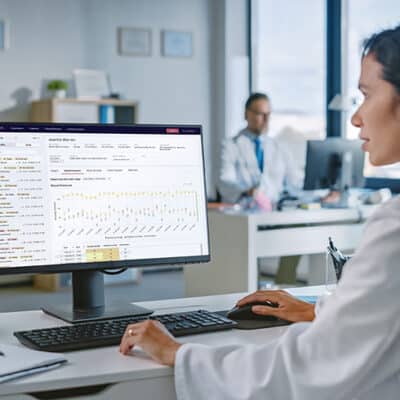Healthcare organizations, hospitals and physician practices have been leveraging the benefits of remote patient monitoring (RPM) for years due to its ability to help support disease management, improve patient outcomes, and reduce hospitalization and readmission rates. However, it was the sudden necessity for remote care and the subsequent changes made to reimbursement brought on by the pandemic that accelerated the rapid adoption of telehealth across the US.
As a result, many healthcare organizations and providers have sought trusted telehealth companies to implement RPM into their practices. Whether your practice is looking to implement an RPM program for the first time, or you have an existing program, and you are seeking a better fit, understanding what to look for in an RPM partner can make all the difference in the success of your program.
The following are key questions you should be asking when considering an RPM partner:
How experienced is the remote patient monitoring company?
With so many new start-ups entering the market, it is important to be confident that your RPM provider is established and can offer comprehensive capabilities that support your practice workflows. A well-established provider should not only have proven outcomes data and testimonials, but they should also have a strong reputation in the market and be able to support and scale with your needs.
Other questions to consider:
- How many practices and patients do they serve?
- Do they have outcomes to demonstrate their results?
Together, 100plus and Connect AmericaOpens a new window have more than 45+ years of life-saving experience in the connected health industry. With over 10M lives protected, 900K active subscribers and 40K+ patients monitored, we enable healthcare organizations across North America to better monitor and manage their patient’s health while delivering smarter interventions that improve patient outcomes and lower care costs. Read more about our proven results.
What does your onboarding process look like, and how are patients enrolled in the program?
When choosing an RPM vendor, the success of the program can often be determined by the level of support provided. Most physician practices are overwhelmed and understaffed, which is why it is important to find an established partner who can offer a complete end-to-end solution that supports your practice through each step of the process.
Other questions to consider:
- How are eligible patients identified?
- Who handles insurance verification and patient consent?
100Plus’ provides a comprehensive full-scale service that supports practices from implementation and enrollment throughout the entire program, including:
- Identification of eligible patients
- Insurance eligibility verification
- Patient consent and training
- Devices are shipped directly to patients, ready to use
- Patient data monitoring and billing support
- Continuous patient outreach to ensure adherence with an AI-virtual health assistant
- Devices and consumables are provided as needed
- Continuous evaluation of the program, including new and ongoing patient eligibility verifications
What type of support is available to the practice?
One of the challenges standing in the way of higher RPM adoption is patient adherence. Many patients lack the training, support, and motivation to utilize RPM effectively, and most practices simply do not have the time to ensure patients are staying compliant. Finding an RPM partner that can not only help your practice but who can also provide ongoing patient education and support is essential to your program’s success.
Other questions to consider:
- Does your company offer training or support for patients?
- How do you help ensure patients will adhere to the program?
100Plus is the only RPM provider that has an AI-virtual health assistant to help ensure patient adherence. Patients enrolled in the program receive smart text-based communications on behalf of the practice reminding them to take their readings and providing education and support. This helps increase patient adherence and leads to higher patient retention, which helps ensure the success of your program. Practices that implement 100Plus AI outreach have seen over a 2X increase in the RPM adoption rate among enrollments.
Does your RPM integrate with our Electronic Health Record system?
Another challenge for healthcare systems and practices looking to integrate RPM is limited interoperability. To ensure a successful program, an RPM should integrate into an existing electronic health record (EHR). This integration is necessary for clinical efficiency because it enables providers to monitor patients within their existing workflows.
100Plus RPM solution makes it possible to integrate with any of the leading EHR vendors. This helps facilitate more streamlined workflows, reduces manual procedures, and simplifies the claims and billing process.
What is your capacity, and how quickly can you scale up and down, when necessary, in response to patient volume?
Scalability is one of the biggest concerns for practices when it comes to implementing an RPM program. Without the ability to scale quickly, when necessary, your program may be at risk. Not all RPM companies have the staff and equipment to handle the size and scope of your organization’s needs.
100plus is a full-service provider that has the experience and capacity to manage both small-scale and large-scale programs, ensuring that your practice can continue delivering patient care continuously through fluctuations in patient volume.
What type of devices does your RPM solution include?
Connectivity is another important factor to consider when choosing an RPM company. Many patients do not have access to the internet, which can pose accessibility challenges. Determining what type of equipment the RPM provider offers and whether they offer the right options for your patients will be essential when deciding on a partner.
Other questions to consider:
- Are the devices cellular-based?
- Will I be charged per device, or can I assign as many devices as necessary to the patient?
Cellular-based equipment can transmit data via a cellular connection, which makes it more reliable and easier to set up. Patients can simply take the device out of the box and use it, and the physiologic data will sync through the wireless network. For this reason, cellular-based devices are often more patient-friendly and age-agnostic.
Other important factors to consider are whether the company charges per device or if you can assign as many devices as necessary for the patient. With 100plus, devices and consumables are unlimited, and practices may choose from the devices that best suit their patient, including pulse oximeters, blood pressure cuffs, glucose monitors and digital weight scales.
How much does RPM cost?
Finding the right pricing model is a key factor when considering which RPM vendor to partner with. Make sure to ask about the upfront costs and other fees such as monthly connection charges, consumables, app fees, and device charges. Look for a partner whose pricing model is flexible and based on practice reimbursement. This incentivizes the vendor to ensure your program is effective and efficient.
Other questions to consider:
- What additional fees will be incurred?
- Who is responsible for the costs of the consumables?
The 100plus model is based on improving patient enrollment and adherence, thereby maximizing practice revenue. There is no upfront investment or additional charges for consumables and extra devices. This model is set up to help ensure your RPM program’s success.
100Plus delivers a comprehensive end-to-end offering that includes monitoring, patient outreach, enrollment, device setup and education, and ongoing support. From implementation and enrollment, throughout the entire process, our team of experts are here to ensure your program’s success – so you can focus on delivering exceptional care.
Finding the right RPM partner can make all the difference. By choosing a reputable and established RPM provider with a proven track record, your practice will be well-positioned for easy implementation and continued success.



